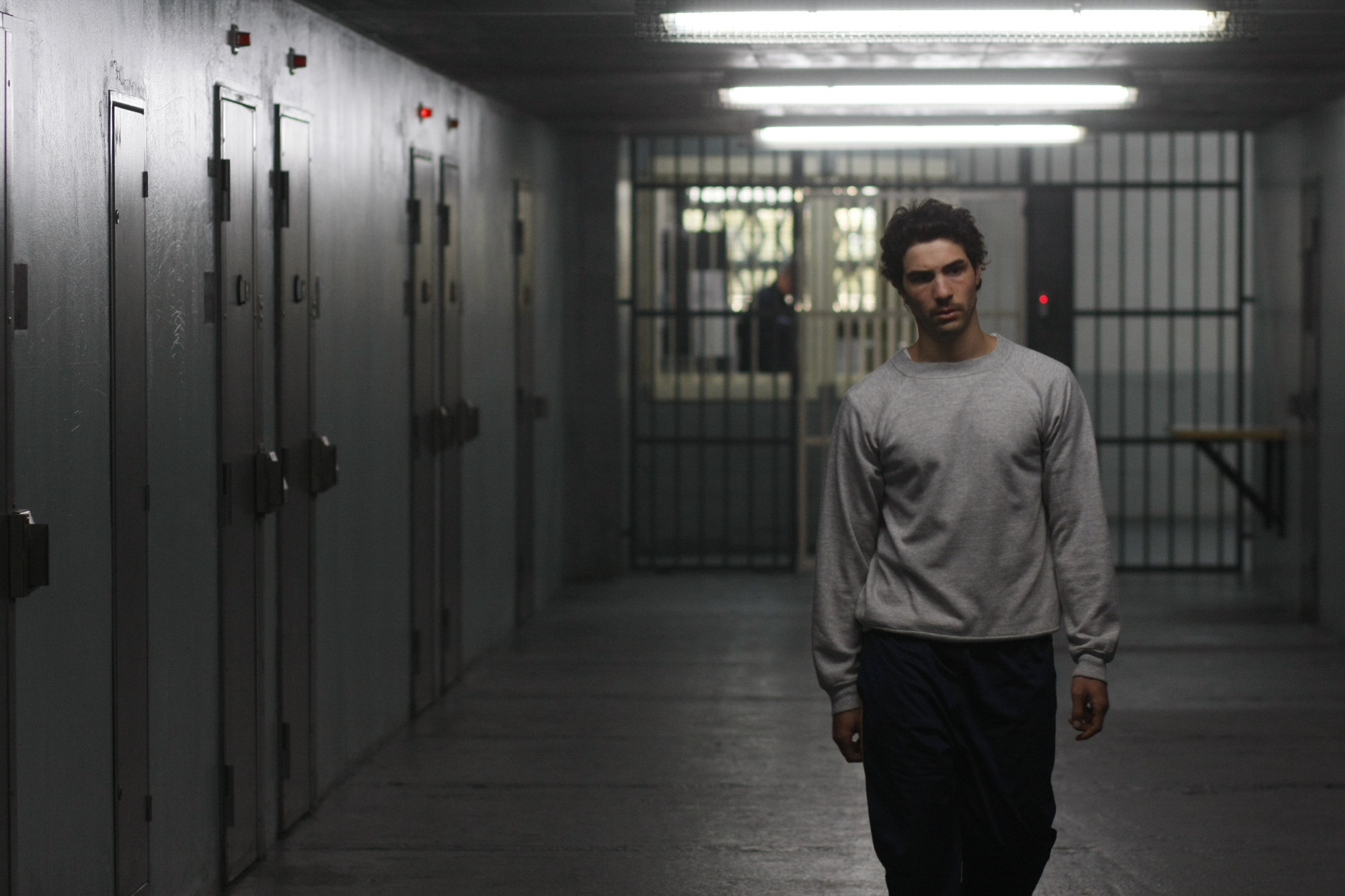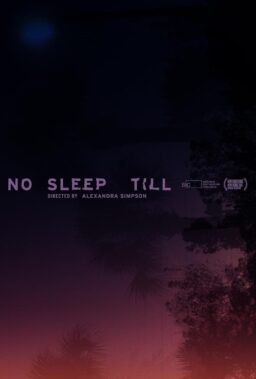It is always fascinating to see a smart character rise the bottom, step by step, and French film “A Prophet” is one of such cases. Here is a plain young man thrown into a grim, violent closed world filled with dangerous criminals, and it is both unnerving and compelling to watch him learn, survive, grow, and prevail through his “education.” While we are often alarmed to see the gradual formation of his criminal identity, we cannot help but watch his progress with curiosity and fascination, and “A Prophet” supremely works as a gritty but electrifying mix of character study and crime drama.
Its hero is Malik (Tahar Rahim), a 19-year-old illiterate French lad of Arab descent. The movie opens with him being kept in custody, and we do not learn much about him except that he is sentenced to six-year incarceration for beating a police officer. He claims he is innocent, but that does not matter much, because he is already about to be transferred to a prison where he is going to be incarcerated for at least three years. Once he arrives in the prison, he is quickly stripped of his possession and privacy, and he soon begins his first day while being nervous and uncertain as before.
As a lone prisoner who does not belong to any group in the prison, Malik quickly becomes an easy prey. When he walks around alone in the prison yard, a prisoner suddenly approaches to him, and then he and other prisoner take away Malik’s sneakers. Malik tries to fight back, but he has no chance from the beginning, and that is the first hard lesson for him.

While continuing his solitary status, Malik comes to draw the attention of César (Niels Arestrup), a Corsican gang member who sees that Malik can be useful for him. An Arab prisoner named Rayeb (Hichem Yacoubi) is recently transferred to the prison, and César is ordered to eliminate him before he testifies against a high-ranking member of César’s gang organization. As an Arab prisoner not associated with any particular group in the prison, Malik looks like someone who can easily approach to Rayeb without provoking any suspicion, so César and his fellow Corsican prisoners approach to Malik one day, and César demands Malik that he should kill Rayeb soon.
Because he has never killed anyone before, Malik understandably becomes quite agitated and conflicted, but there is not any other option for him. César and his gangs virtually have the prison under their control, and Malik learns another hard lesson when he tries to contact the warden. Eventually, he comes to follow César’s demand, and we get a cringe-inducing moment as he does some practice with a sharp razor blade, which he will have to hide in his mouth when the time comes.
However, that moment is nothing compared to the subsequent killing scene, which is utterly gut-wrenching, to say the least. Malik tries to stay calm and cool, but then he clumsily attempts to kill his target, and the result is quite messy and bloody. I remember well when I watched the movie at ther Music Box Theater in Chicago during one afternoon of April in 2010; a woman sitting in front of me gasped and then turned her head away from the screen during that scene. That memory instantly came back to me while I watched that scene again a few days ago.
After managing to kill Rayeb, Malik finds himself becoming more associated with César and his gangs, and he makes some advancement for himself. He begins to attend a class for learning how to read and write, and he also becomes more attentive to how the system works among prisoners and guards. He turns out to be a pretty smart student who can quickly learn and grow, and he becomes more confident and experienced as days go by. Observe how shy and introverted he looks in the beginning. And look at how much he talks and behaves differently around the time when his “first birthday” comes.
While he gradually becomes watchful of Malik’s progress, César comes to need Malik more than before as his power in the prison is considerably deflated after many of his gang members leave the prison. After learning that Malik can speak Corsican, he decides to utilize Malik more, so Malik is allowed to have a brief furlough outside the prison for taking care of his boss’ business matter. At one point, he even flies to South France for a meeting an Arab gang boss, and he does not hesitate when he sees an opportunity to benefit himself.

Besides César, some other prisoners also become crucial parts of Malik’s formative years. From a gypsy drug dealer named Jordi (Reda Kateb), he learns Criminal Economics 101, and they come to work together when a substantial amount of drug comes into their hand. From a fellow Arab inmate Ryad (Adel Bencherif), he gets not only an extra help for his writing class but also real friendship, and he also comes to learn responsibility when Ryad gets ill again after his early release and Ryad’s family needs help and support.
As we watch him learn and advance more and more, we cannot help but wonder what Malik would become if he had grown up in a more positive environment. But the movie does not make any judgment on his criminal maturation, and it often throws us into the thrill and excitement felt from his rapid rise in the system. “A Prophet” gives us a number of energetic sequences palpably depicting this dramatic process, and it also effectively utilizes several songs including Nas’ “Bridging the Gap” and Turner Cody’s “Corner of My Room,” which make a good aural contrast to Alexandre Desplat’s somber but tense score.
While firmly maintaining its raw, gritty ambience via its considerable realism and verisimilitude, the movie is willing to shift itself onto different moods, and that is particularly exemplified well by an odd relationship between Malik and Rayeb, who often appears around Malik as a ghost when Malik is alone in his cell. He may represent Malik’s guilt and conscience at first as reflected by their first hallucinogenic scene, but then he comes to function as another friend/adviser to Malik. He even becomes a sort of spiritual guide to Malik when Malik is about to commit another criminal act which will impact on his life in one way or another.
As the center of the story, Tahar Rahim, a fresh newcomer when he was cast for the movie, is superlative with subtle gestures and nuances which give us a glimpse into the silent but dynamic development inside his character. While it is uncomfortable to watch his transformation from a naïve young man to a hardcore criminal, Malik remains an interesting human being to observe, and Rahim does a commendable job of slyly suggesting his character’s thoughts and feelings while not revealing too much at all. We are often so sure about what exactly Malik thinks as he frequently keeps his counsels like Michael Corleone did, but it is compelling to watch how he cleverly maneuvers others around him for his survival and benefit. By the end, we come to feel a sort of satisfaction when he is about to begin the next chapter of his criminal life.

As various criminal figures teach their own things to Malik, the supporting performers surrounding Rahim are also very effective. The best performance comes from Niels Arestrup, whose intense performance complements well Rahim’s low-key acting. Along with Rahim, Arestrup strongly conveys the inevitable shift in their characters’ strained relationship, and their best moment comes from a certain wordless moment between their characters later in the movie. They do not say anything to each other while looking at each other from the distance, but the situation is quite clear to us as well as them.
“A Prophet” is directed by Jacques Audiard, who has been constantly interested in characters coping with challenging circumstances they are thrown into. While “A Self Made Hero” (1995) is an amusing black comedy about a smart, innocent liar who disguises himself as a war hero right after World War II and almost gets away with that, “The Beat That My Heart Skipped” (2005) follows a young criminal’s rocky struggle toward his artistic aspiration, and “Rust and Bone” (2012) focuses on the developing relationship between two different people who must rise from each own gloomy bottom. In case of his recent work “Dheepan” (2015), this flawed immigrant drama is not as successful as intended, but its subjects are not so far from his other works, and it is still an interesting work to note.
In addition to being Audiard’s best work to date, “A Prophet” is a top-notch genre piece which distinguishes itself with its deft storytelling and an impeccable performance. When I watched it for the first time in November 2009, I was not entirely sure whether it was a masterpiece as many others said, but my recent viewing confirmed to me that it is indeed a great prison drama film. Like its hero, the movie deserves full marks.











